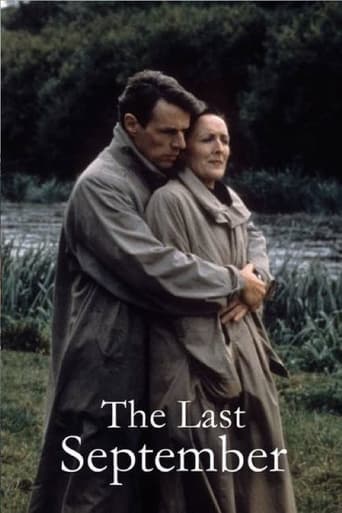

A family of British aristocrats living in County Cork finds their comfortable lifestyle threatened by the Irish rebellions of the 1920s, when the headstrong older daughter develops a fatal attraction for a notorious local patriot (i.e. terrorist) with a price on his head.This won't be the last film to dissect the bloodlust lurking just beneath the glacial politeness of upper-crust British manners, but the perceptive screenplay (adapted from a novel by Elizabeth Bowen) shows an unbiased lack of sympathy for either side of the conflict. Deborah Warner makes an easy transition from a theater background for her feature film debut, directing a first-rate cast (including Michael Gambon, Maggie Smith, and Fiona Shaw) with impressive, understated visual flair and an eye for the telling detail. The specific Anglo-Irish perspective could make the film a tough sell to American moviegoers unschooled in the social/political snake pit of Emerald Isle antipathy (here placed into an intriguing, almost tribal context), which may explain why the promotional trailers make it look like any other romantic melodrama in funny period dress. It's a misrepresentation likely to alienate the film's target audience, but discerning viewers should find plenty here to provoke their thoughts.
... View MoreAbsorbing screen play. Not easy, not especially familiar to many of us but extremely thought-provoking, given the Anglo-Irish theme and the time in which the film is set. An excellent cast led by the magnificent Maggie Smith who simply oozes condescension, snobbery, class-ism and caste-ism, while displaying genuine affection for 'her own kind of people'. The setting of faded yet comfortable gentility is just right and the inclusion of down-on-their-luck relatives rings true also. Keely Hawes creates the right air of fragility, self-absorption and feyness. Her scenes with the admirable Fiona Shaw are powerful and reflect her dawning sense of self and of a desperation to escape, as the story unfolds. And David Tennant? Heartbreakingly real as the young would-be lover and army officer. What a very fine actor he is, despite a rather anaemic and quite unnecessary moustache. So good too to see the excellent Richard Roxburgh, playing Tennant's best pal in the army. In summary, a film that is worth making the effort to see and to mull over. An auspicious beginning for Deborah Warner.
... View MoreThe narrative is a mess but there are many fine visuals and isolated moments of deep emotional intensity. Michael Gambon and Maggie Smith were excellent, but Jane Birkin and Fiona Shaw have some of the most powerful scenes, with their relationship problems seeming to amplify the dislocation all the characters are feeling, Irish but not Irish, English but not English. However, it is Keely Hawes' intense performance as Lois that held the movie together for me, with her coming of age, and the relationship choices she must make, personalizing the larger conflict between English and Irish that the film wants to illuminate.This is director Deborah Warner's first film (she's an experienced stage director) and I feel she relied too much on her cinematographer, Slavomir Idziak. He did a very fine job with the landscapes and interiors, but there are too many gratuitous camera tricks and heavy-handed visual cues that don't contribute anything to the story or it's impact. Overall, worth seeing for the performances and questions of national identity it raises. The interviews with Fiona Shaw and Deborah Warner on the DVD are also worth a look.
... View MoreHaving tried to read the novel on which this movie was based and not enjoyed doing so all that much, this film was an unexpected delight. While Bowen's style is often tedious, Banville's adaptation moves along at a sprightly pace that belies it's tragic, Chekovian subject matter. Like BBC's Persuasion and Vanity Fair, this film tries to rescue the period adaptation from the asphixiating clutches of Merchant-Ivory while retaing a large degree of textual integrity. Banvill, who brought the Irish "Big House" novel into the postmodern era with _Birchwood_ brings a contemporary eye to this tale of Anglo-Irish Aristocrats in the Last Days of their tenure. It's wonderfully acted, with Jane Birkin giving the sort of display of gap-toothed Anglo-Saxon diffidence that made _La Belle Noisuise_ tolerable; Maggie Smith doing her usual indignant aristocrat, Fiona Shaw playing Fiona Shaw, and Micheal Gambon thankfully playing an Anglo-Irish rather than Irish character. It's a film that anyone with a casual interest in Irish history will be enlightened by and one that anyone with an eye for beauty will be delighted by.
... View More